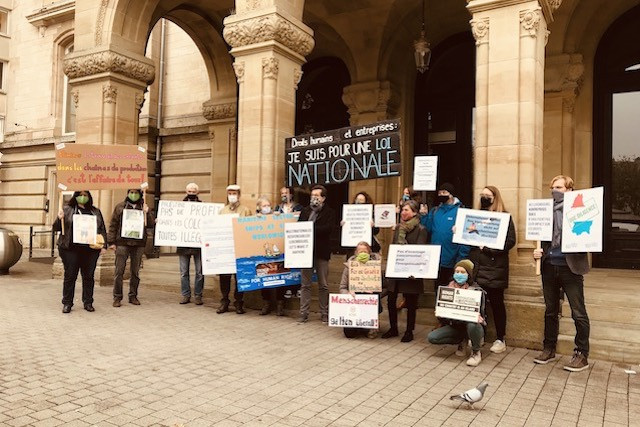A small group of protesters gathered outside the Cercle Cité in the capital on 11 November, waving banners while Jean Asselborn (LSAP) delivered his annual foreign policy speech to members of parliament inside the venue.
Unlike other EU countries, Luxembourg currently does not mandate companies to prove they respect human rights along their supply chains.
Asselborn at a press conference in February had said the University of Luxembourg would carry out a feasibility study on introducing such regulation, adding, however, that he would prefer EU-wide standards. The results of the study are yet to be released.
In France, for example, companies with more than 5,000 employees--as well as their subsidiaries, subcontractors and suppliers--must undergo an assessment of environmental, human rights and corruption risks. The UK in 2015 passed the Modern Slavery Act, with the Netherlands following in 2017 with child labour due diligence laws.
With Luxembourg running for a two-year seat on the UN’s Human Rights Council--which will be voted in October next year--the Luxembourg due diligence initiative said it was high time to propose legislation and lead by example.
“Finland, like Luxembourg, is also a candidate for a seat on the United Nations’ Human Rights Council. The Finnish government in its coalition agreement foresees the introduction of a law on due diligence obligations in the area of human rights and companies,” the group of activists said in a press release.
In lieu of due diligence laws, Asselborn in February had presented a new action plan. Measures included more thorough checks of companies taking part in public calls for tender as well as establishing due diligence procedures in companies where the state is a majority shareholder, such as the Spuerkeess bank, rail operator CFL or the Post.
The UN in 2011 adopted guiding principles stating that all member countries “must protect against human rights abuse within their territory and/or jurisdiction by third parties, including business enterprises. This requires taking appropriate steps to prevent, investigate, punish and redress such abuse through effective policies, legislation, regulations and adjudication.”
The issue had come into the spotlight after Israeli spyware firm NSO Group--which has offices in Luxembourg through an affiliate business--was linked to the killing of Saudi Arabian journalist Jamal Khashoggi in Istanbul in 2018.
The Luxembourg government last year said it would not investigate the company, with Asselborn at the February press conference explaining: “We need to be able to prove it. In this case nobody could prove to us that this was the case.”
Amnesty International in June this year said NSO spyware had been used against a Moroccan journalist, saying the company “clearly cannot be trusted.” Reuters in January reported that the FBI is probing possible hacks using NSO software on US residents and companies.
